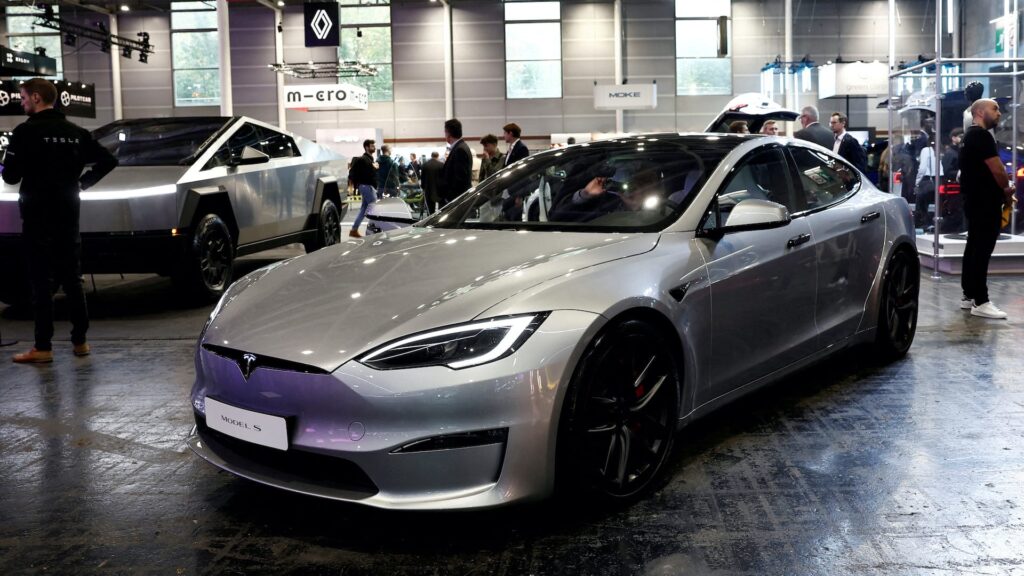Tesla’s recent stock drop has puzzled many. On Monday, its shares plummeted by over 15%, marking it as the S&P 500’s worst performer. With such a drastic fall, one might expect the company’s valuation to follow suit. However, Tesla’s valuation remains robust, sparking debates about its true worth.
Amid the stock market’s rollercoaster, investors are left wondering what drives Tesla’s high valuation. Some attribute it to Elon Musk’s vision, while others are skeptical about the company’s prospects. This piece unravels why Tesla’s market value remains high despite its recent setbacks, exploring the forces behind this phenomenon.
The Recent Plummet
Tesla’s stock price has taken a significant hit, dropping nearly half in the last three months. Just recently, it fell over 15% in a single day. These numbers may alarm investors, but the underlying reasons are multifaceted. It’s not just about the price drop but what it signifies for Tesla’s future.
Elon Musk’s Influence
A key factor in Tesla’s valuation is Elon Musk’s compelling vision for the company. Investors are drawn to his promise of revolutionizing the auto industry with AI and autonomous vehicles. This allure keeps Tesla’s valuation soaring, despite its struggles. Musk’s vision often overshadows immediate financial metrics, focusing instead on future potential.
This approach has fueled debates about whether Tesla is overpriced. Critics argue that relying heavily on Musk’s promises holds inherent risks. Still, for many, the gamble seems worth it.
Tesla’s Market Standing
Tesla might be struggling with stock prices, but its market standing tells a different story. With a total worth of $845 billion, it surpasses the next nine biggest automakers combined. Despite selling far fewer cars, Tesla’s dominance in the market remains unshaken.
Comparisons with competitors emphasize Tesla’s unique position. While others rely on tangible sales, Tesla bets on future capabilities. It’s this stark contrast that captures the attention of investors seeking innovation over immediate returns.
In essence, Tesla’s high valuation isn’t merely about today’s figures. It’s about a belief in its future trajectory, despite the present hurdles its stock faces.
Challenges in the Electric Vehicle Market
Despite its high valuation, Tesla isn’t exempt from challenges. Falling sales figures have raised concerns about its market strategy. Can Tesla sustain its growth amid such industry pressures?
The increasing competition from other electric vehicle makers pressures Tesla to maintain its lead. These players pose real challenges, potentially shaking Tesla’s hold on the electric vehicle market. Innovations and strategic pivots are crucial.
Marketing strategies and new vehicle launches are only part of the equation. Continuous advancements in technology and infrastructure will determine Tesla’s longevity in a fast-evolving market.
Autonomous Vehicles: Dream or Reality?
Autonomous vehicles promise a revolution, but Tesla has yet to deliver on this front. Musk has repeatedly assured the release of driverless cars since 2016. Yet, timelines continue to stretch, raising investor skepticism.
Despite delays, many hold faith in Musk’s ability to steer Tesla towards this technological leap. The prospect of autonomous vehicles is a magnet for investors, projecting Tesla as a leader in innovation.
This vision sustains Tesla’s lofty valuation. However, the gap between promises and reality is a persistent challenge, one that Tesla must navigate carefully to maintain investor trust.
Political Distractions
Politics often distract from Tesla’s core objectives. Musk’s involvement in political controversies, including ties with former President Donald Trump, diverts attention. Such activities have prompted concerns about their impact on Tesla’s operations.
These political entanglements could be a double-edged sword, potentially alienating stakeholders. Meanwhile, supporters argue that Musk’s political presence enhances his influence, indirectly benefiting Tesla.
Navigating these political waters is complex, requiring Musk’s focus to balance corporate responsibilities with external engagements.
The Future of Tesla
Looking ahead, Tesla’s future is both promising and uncertain. The balance between current challenges and future potential is delicate. Investors must weigh immediate concerns against long-term prospects.
Tesla’s journey is emblematic of the broader shifts in the automotive industry. As electric vehicles rise, Tesla’s innovative edge might determine not just its survival but its leadership role. This future narrative is enticing for many investors.
Therefore, the potential for growth, though fraught with risks, keeps Tesla’s valuation buoyant despite the stock’s volatility.
Market Reactions
Investor reactions to Tesla’s fluctuations remain mixed. Some see the stock drop as an opportunity, while others urge caution. The company’s reputation for bouncing back fuels optimism.
The resilience of Tesla’s valuation showcases confidence in its long-term strategy, despite immediate market reactions.
While the stock market remains unpredictable, Tesla’s drawn-out story continues to captivate investor and public interest alike.
Tesla’s journey through market volatility highlights both opportunities and risks. Its high valuation reflects a gamble on future innovation rather than current profits. Investors are torn between skepticism and hope, as Tesla continues to chart its path forward through the tumultuous landscape of the automotive industry.





